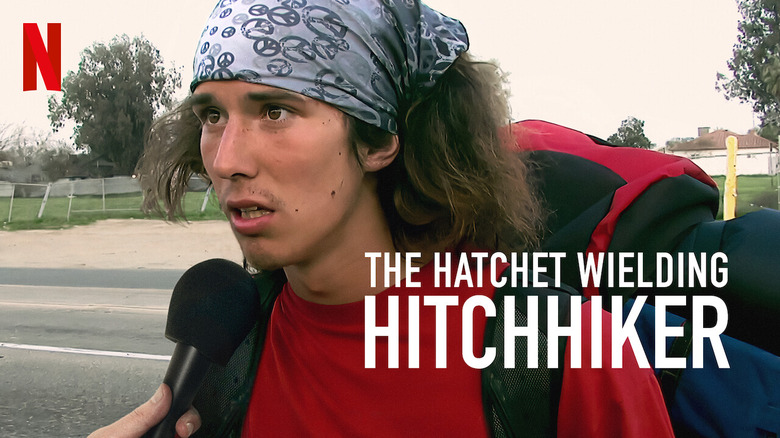Man Sues Netflix After His Photo Was Accidentally Used In A True Crime Documentary
One of the more enduring viral videos of the last decade became the centerpiece of a Netflix true crime documentary early this year. Dubbed The Hatchet Wielding Hitchhiker, the documentary focuses on a charming homeless drifter named Kai, whose real name is Caleb McGillvary.
Kai became a viral sensation following a 2013 interview with a local news channel. The interview centered on Kai using a hatchet to beat a man who was attacking an innocent woman. Kai's affable and somewhat quirky persona, coupled with his somewhat bizarre answers to innocuous questions, propelled him to seemingly instant stardom. Before long, he had imprinted himself across the mainstream media, including an appearance on Jimmy Kimmel Live!
Kai's story, however, took a tragic turn when he was arrested and subsequently convicted of murder a few months later. This hero-turned-villain story forms the backbone of Netflix's true crime documentary which is well worth watching in its entirety.
With that as a backdrop, an interesting story emerged in the wake of the documentary's release. It turns out that one of the photos used in the documentary featured a Kentucky man named Taylor Hazlewood. In the photo, which originally surfaced on Instagram, Hazlewood is seen holding a hatchet. All the while, Hazlewood has absolutely zero connection to the true crime saga whatsoever. As a result, Hazlewood is suing Netflix for defamation for associating his photo with a convicted murderer.
The complaint reads in part:
The film has been viewed by tens of thousands of people, and as a result of Netflix's false portrayal of him as, dangerous, as a murderer, and/or as an untrustworthy person, he has been subjected to personal distress, anguish and reputational harm.
A closer look at the wrong photo
The photo used in the Netflix true crime documentary is viewable below:
As a point of contrast, you can see what Kai looks like via the video that shot him to fame about a decade ago:
Hazlewood's attorney said that Hazlewood's Instagram photo had no connection to Kai and that Netflix would have known this had it engaged in even a modicum of research.
"There should have been no confusion by any company doing its homework when sourcing content," Hazlewood's attorney said in a statement to Entertainment Weekly.
Hazlewood's complaint notes that he has had many friends and acquaintances reach out to him to explain why his photo was in the documentary. The complaint further notes that the entire saga may impact his chances of finding and keeping employment.
The complaint further adds that Netflix is accountable for causing Hazlewood a lot of "reputational harm."
Hazelwood is suing for $1 million in damages.

